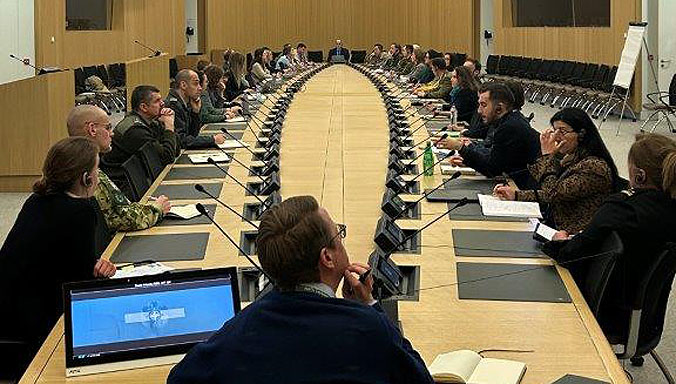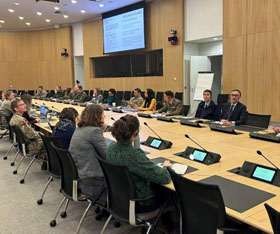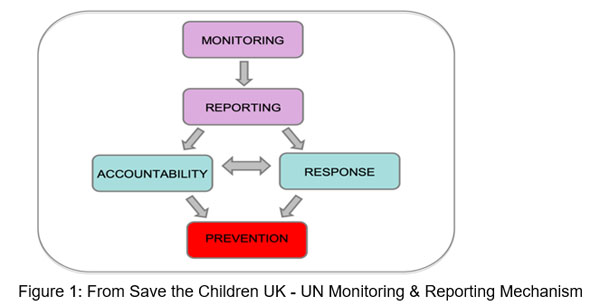Deep Dive Recap: Children and Armed Conflict and the Gender Perspective
- English
- French
On the 17th January 2023, the NATO International Military Staff Office of the Gender Advisor (GENAD) hosted its eighth Deep Dive Session, this time focused on Children and Armed Conflict (CAAC) and the Gender Perspective. The session highlighted NATO’s role in addressing CAAC while integrating a Gender Perspective, along with the military challenges to consider when addressing violations against girls and boys in a conflict setting.

Subject matter expertise was provided by Lieutenant Colonel Francisco Gonzalez, a Conflict Advisor at SHAPE, Ms. Aysegul Binali, a Humanitarian Affairs Officer and Alternate GENAD at NATO’s Allied Land Command (LANDCOM), Major Jason Wright, a Human Security Officer from the 77th Brigade in the UK Army and Mr. James Denselow, the Head of Conflict, Humanitarian Policy and Advocacy at Save the Children UK.
Children and Armed Conflict at NATO
Lieutenant Colonel Gonzalez opened the Deep Dive session with an overview of how NATO addresses CAAC through its mandates and guidance documents. He explained NATO’s role as a child protection actor, alongside the international community, and its commitment to the implementation of United Nations Security Council Resolutions on the protection of children in armed conflict.
Lieutenant Colonel Gonzalez described how NATO supports UN monitoring and reporting mechanisms on CAAC and how the UN resolutions are integrated into NATO’s planning, operations and missions, education, trainings, exercises and evaluation. He further stressed the need to balance commitment with resourcing, to ensure that missions tasked with a clear CAAC mandate are allocated the necessary resources to proceed accordingly.
Building upon Lieutenant Colonel Gonzalez’s presentation, Ms. Binali further explained how CAAC is built into NATO operations, trainings and evaluations as well as the different considerations NATO needs to account for in its approach to CAAC. Ms. Binali explained the working practices and procedures within NATO that address CAAC, including the information sharing, supportive activities to the monitoring and reporting mechanism, and how records are archived and retained. Ms. Binali further highlighted the importance of addressing CAAC for NATO as a “moral imperative, a legal responsibility, and a question of international peace and security”.
Understanding and Approaching Children and Armed Conflict

As a child protection expert and former International Law Officer for the UN, Ms. Binali also outlined the 6 grave violations against children, explained how children are defined in terms of CAAC, and described the various push and pull factors that may lead to their recruitment as child soldiers. Citing the Global Statistics on CAAC from the 2022 UN Secretary General’s Annual report, Ms. Binali highlighted the prevalence of violations against girls and boys as victims of war and conflict and explained their differentiated needs. She explained that the violations are all gendered in a way, using conflict-related sexual and gender based violence (CRSGBV), sexual exploitation and abuse and trafficking as key examples where integrating the gender perspective is crucial to understanding the individual children’s needs.
Following Ms. Binali, Major Wright explained how we can better integrate CAAC as a cross-cutting topic and outlined additional considerations to factor into planning and conduction of operations. He illustrated the need for CAAC to be integrated across all military staff branches and stressed the importance of sex and age disaggregated data as part of that integration. Major Wright discussed how within the UK context, CAAC, as a Human Security topic, is incorporated into all aspects of operations and explained how the UK works to integrate Human Security in all military domains. In addition, he explained the crucial importance of ensuring that the cross-cutting nature of CAAC is reinforced. This requires due consideration for its relationship to topics such as gender, human trafficking, building integrity and the wider protection of civilians. Major Wright also echoed Lieutenant Colonel Gonzalez’s sentiments to balance resourcing to fulfil the mission mandate and discussed how external expertise and cooperation can be utilised at the appropriate level.
Lastly, Mr. Denselow laid out how NATO can coordinate with other child protection actors in the international community to fulfil its commitment to child protection, and how the UN Monitoring and Reporting mechanism operates as an accountability tool. He identified training opportunities and discussed utilising the civilian-military structures and other cooperation opportunities to support NATO in integrating CAAC in structure.
Mr. Denselow also discussed the need for the active use of accountability mechanisms at the national, regional and international levels to address violations against children in conflict. He further explained the purpose of the UN Monitoring and Reporting Mechanism to act as an accountability tool.
He explained that this mechanism is critical to fostering accountability for state and non-state armed groups that commit grave violations against children. He elaborated on the fact that listing parties, by including them in the annexes to the Secretary General’s Annual Report, holds them accountable for their actions. It further incentivises listed parties to cooperate with international bodies to develop prevention and intervention programmes to respond to the violations against children they are listed for.

NATO has a critical role in supporting the UN Monitoring and Reporting Mechanism and its cooperation with other international bodies for training and information sharing can help the Alliance better fulfil is commitment to the protection of children in armed conflict.
Protecting boys and girls from armed conflict is a key humanitarian issue. NATO’s recently adopted Human Security Approach and Guiding Principles highlight the impact of grave violations against them in enhancing operational effectiveness and contributing to lasting peace and security. Societal norms are an important factor in the conflict-related violations and vulnerabilities that boys and girls face, thus understanding and integrating the gender perspective into NATO’s considerations for CAAC is crucial.
